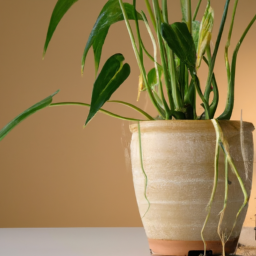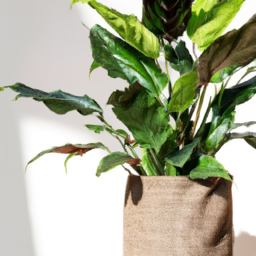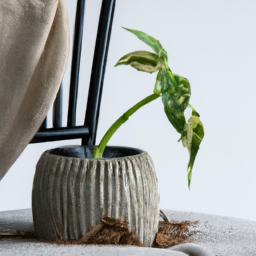
Have you ever wondered how indoor plants can benefit our overall well-being? In this blog post, we will explore the various ways in which indoor plants can help us improve our physical and mental health. From purifying the air we breathe to reducing stress and boosting productivity, indoor plants have a multitude of benefits that can enhance our daily lives. So, let’s dive in and discover just how indoor plants can positively impact us in more ways than one.
The Benefits of Indoor Plants for Health and Well-being
Indoor plants are not just a beautiful addition to your home decor, they also offer a wide range of benefits for your health and well-being. From improving air quality to reducing stress levels, indoor plants can have a positive impact on your overall quality of life. In this article, we will explore the various ways in which indoor plants can help us lead healthier and happier lives.
Improving Air Quality
One of the most well-known benefits of indoor plants is their ability to improve air quality. Plants absorb carbon dioxide and release oxygen through the process of photosynthesis, which can help to purify the air in your home. In addition, plants can also remove toxins such as formaldehyde, benzene, and trichloroethylene from the air, which are commonly found in indoor environments. By having indoor plants in your home, you can breathe cleaner, fresher air and reduce your risk of respiratory problems and other health issues.
Some of the best plants for improving air quality include spider plants, peace lilies, and snake plants. These plants are known for their ability to remove harmful toxins from the air and create a healthier indoor environment. By incorporating these plants into your home decor, you can enjoy the benefits of cleaner air and better respiratory health.
In addition to purifying the air, indoor plants can also help to increase humidity levels in your home. Plants release water vapor through a process called transpiration, which can help to combat dry air and reduce the risk of respiratory problems such as dry skin, sore throat, and coughing. By having indoor plants in your home, you can create a more comfortable and healthy living environment.
Reducing Stress and Anxiety
Another benefit of indoor plants is their ability to reduce stress and anxiety. Studies have shown that being around plants can have a calming effect on the mind and body, helping to lower blood pressure, reduce heart rate, and promote relaxation. The presence of greenery indoors can create a sense of tranquility and connection to nature, which can have a positive impact on your mental well-being.
In addition, caring for indoor plants can also be a therapeutic activity that can help to reduce stress and improve mood. The act of watering, pruning, and tending to plants can be a meditative practice that promotes mindfulness and relaxation. By incorporating indoor plants into your daily routine, you can create a peaceful and rejuvenating space that promotes mental and emotional well-being.
Some of the best plants for reducing stress and anxiety include lavender, jasmine, and aloe vera. These plants are known for their soothing scents and calming properties, which can help to create a serene and stress-free environment. By surrounding yourself with these plants, you can create a peaceful oasis in your home where you can relax and unwind.
Promoting Productivity and Creativity
Indoor plants can also help to boost productivity and creativity in the workplace or at home. Studies have shown that having plants in your environment can improve concentration, memory, and cognitive function, leading to increased productivity and efficiency. The presence of greenery can also stimulate creativity and innovation, helping you to think more clearly and come up with new ideas.
In addition, plants can help to reduce noise levels and create a more peaceful and productive work environment. The leaves and branches of plants can absorb sound waves, helping to minimize distractions and create a quieter space for focus and concentration. By incorporating plants into your workspace, you can create a more inspiring and productive environment that supports your professional and creative endeavors.
Some of the best plants for promoting productivity and creativity include succulents, cacti, and pothos plants. These plants are low-maintenance and easy to care for, making them ideal for busy individuals who want to enjoy the benefits of indoor plants without a lot of effort. By adding these plants to your workspace, you can create a more stimulating and productive environment that enhances your performance and creativity.

Air Purification and Indoor Plant Benefits
Indoor plants are not just aesthetically pleasing additions to our homes and offices; they also play a crucial role in purifying the air we breathe. In today’s world, where pollution levels are on the rise, having indoor plants can significantly improve the quality of the air indoors. Let’s delve deeper into how indoor plants help us in purifying the air and the numerous benefits they offer.
Removal of Toxins
One of the primary ways in which indoor plants help us is by removing toxins from the air. Plants have the remarkable ability to absorb harmful gases such as formaldehyde, benzene, and trichloroethylene, which are commonly found in indoor spaces due to the use of household products, furniture, and building materials. These toxins can have detrimental effects on our health, leading to respiratory issues, headaches, and fatigue. By having indoor plants, we can significantly reduce the levels of these toxins, creating a healthier indoor environment.
Plants also release oxygen during photosynthesis, which is essential for our well-being. Increased oxygen levels in the air can boost our energy levels, improve concentration, and enhance overall cognitive function. This is why having indoor plants in spaces where we work or study can have a positive impact on our productivity and mental clarity.
Furthermore, indoor plants can help regulate humidity levels in indoor spaces. By releasing water vapor through a process called transpiration, plants can increase humidity, which is beneficial for our respiratory health. Dry air can lead to irritation of the throat and nasal passages, making us more susceptible to respiratory infections. Indoor plants act as natural humidifiers, creating a more comfortable and healthier indoor environment.
Enhanced Mood and Well-being
In addition to purifying the air, indoor plants can also have a positive impact on our mental health and well-being. Studies have shown that being around plants can reduce stress, anxiety, and depression. The presence of greenery indoors can create a sense of calm and relaxation, helping us unwind after a long day and improve our overall mood.
Indoor plants can also improve our quality of sleep. Certain plants, such as lavender and jasmine, have calming properties that can promote relaxation and better sleep quality. By placing these plants in our bedrooms, we can create a soothing environment that enhances our rest and rejuvenation.
Moreover, caring for indoor plants can be a therapeutic activity in itself. Tending to plants, watering them, and watching them grow can be a rewarding experience that fosters a sense of responsibility and connection to nature. This can boost our self-esteem and sense of purpose, contributing to our overall happiness and well-being.
Boosted Immunity and Healing
Another benefit of having indoor plants is their ability to boost our immunity and promote healing. Plants release phytoncides, natural compounds that have antimicrobial properties and can strengthen our immune system. Breathing in these phytoncides can help us fight off infections and illnesses, reducing the risk of falling sick.
Furthermore, studies have shown that being in the presence of plants can speed up the healing process. Patients in hospital rooms with plants have been found to recover faster, experience less pain, and require fewer pain medications. The soothing and calming effects of plants can aid in the healing process and improve overall patient outcomes.
In conclusion, indoor plants offer a myriad of benefits beyond just adding beauty to our spaces. From purifying the air to enhancing our mood and boosting our immunity, indoor plants play a vital role in creating a healthier and more harmonious indoor environment. So, next time you’re looking to spruce up your home or office, consider adding some greenery to reap the numerous benefits that indoor plants have to offer.

Mental Health Benefits of Indoor Plants
Reducing Stress and Anxiety
Indoor plants have been shown to have a calming effect on individuals, helping to reduce stress and anxiety levels. The presence of greenery indoors can create a sense of tranquility and relaxation, which can be particularly beneficial in high-stress environments such as offices or homes. Studies have shown that simply being around plants can lower blood pressure and heart rate, leading to a more relaxed state of mind.
In addition, caring for indoor plants can be a therapeutic activity in itself. The act of watering, pruning, and tending to plants can help individuals to focus on the present moment and take their minds off of worries or negative thoughts. This mindfulness practice can be a great way to reduce stress and improve overall mental well-being.
Overall, incorporating indoor plants into your living or working space can help to create a more peaceful and harmonious environment, promoting a sense of calm and relaxation that can benefit your mental health.
Improving Mood and Productivity
Indoor plants have the ability to improve mood and increase productivity in individuals. The presence of greenery indoors has been linked to a boost in mood and overall well-being, leading to a more positive outlook on life. Studies have shown that being around plants can help to reduce feelings of depression and increase feelings of happiness and contentment.
Furthermore, indoor plants can also have a positive impact on cognitive function and concentration. The presence of plants in a workspace has been shown to increase productivity and creativity, as well as improve focus and attention to detail. Having plants in your environment can help to create a more stimulating and inspiring atmosphere, leading to better performance and overall satisfaction.
By incorporating indoor plants into your living or working space, you can create a more uplifting and energizing environment that can help to improve your mood, boost your productivity, and enhance your overall well-being.
Purifying the Air and Promoting Better Sleep
Indoor plants play a crucial role in purifying the air we breathe, helping to remove harmful toxins and pollutants from our indoor environment. Plants absorb carbon dioxide and release oxygen through the process of photosynthesis, which can help to improve air quality and promote better respiratory health. Certain plants, such as peace lilies and spider plants, are particularly effective at filtering out common indoor pollutants like formaldehyde and benzene.
In addition to purifying the air, indoor plants can also help to promote better sleep. Some plants, such as lavender and jasmine, have calming and soothing properties that can help to induce relaxation and improve sleep quality. The presence of plants in the bedroom can create a more peaceful and restful environment, leading to a more restorative night’s sleep.
By incorporating indoor plants into your living space, you can enjoy cleaner air, better respiratory health, and improved sleep quality, all of which can contribute to better overall mental and physical well-being.
Let’s bring it all home
Indoor plants are not just for decoration – they actually provide a multitude of benefits for our health and well-being. One of the most well-known benefits of indoor plants is their ability to purify the air by absorbing toxins and releasing oxygen. This can help improve air quality in our homes and reduce the risk of respiratory issues.
In addition to improving air quality, indoor plants have been shown to reduce stress, boost mood, and increase productivity. Studies have found that simply being around plants can have a calming effect on our nervous system, leading to lower levels of anxiety and a greater sense of well-being. So next time you’re looking to spruce up your living space, consider adding some indoor plants not just for their aesthetic appeal, but for their many health benefits as well.
Frequently Asked Questions (FAQ):
Q1: How do indoor plants improve air quality?
A1: Indoor plants help improve air quality by absorbing carbon dioxide and releasing oxygen through the process of photosynthesis. They also help remove toxins such as formaldehyde, benzene, and trichloroethylene from the air, making it cleaner and healthier to breathe.
Q2: How do indoor plants reduce stress and improve mood?
A2: Indoor plants have been shown to reduce stress levels and improve mood by creating a calming and relaxing environment. The presence of greenery indoors can help lower blood pressure, reduce anxiety, and increase feelings of well-being and happiness.
Q3: How do indoor plants increase productivity and concentration?
A3: Indoor plants can increase productivity and concentration by providing a visually stimulating and vibrant workspace. Studies have shown that having plants in the office or home can help improve focus, creativity, and overall cognitive function.
Q4: How do indoor plants help with humidity levels?
A4: Indoor plants can help regulate humidity levels by releasing moisture through a process called transpiration. This can be especially beneficial in dry indoor environments, as plants can help increase humidity levels and prevent issues such as dry skin, irritated eyes, and respiratory problems.
Q5: How do indoor plants benefit overall health and well-being?
A5: Indoor plants benefit overall health and well-being by purifying the air, reducing stress, increasing productivity, and creating a more pleasant and inviting living or working space. They can also help boost mood, creativity, and overall quality of life.
Dr. Olivia Green is a botanist with over two decades of experience in indoor plant cultivation. She holds a Ph.D. in Plant Biology and has dedicated her career to researching plant behavior in controlled environments. Dr. Green is passionate about helping plant enthusiasts master the art of indoor gardening through her extensive knowledge and practical insights.


